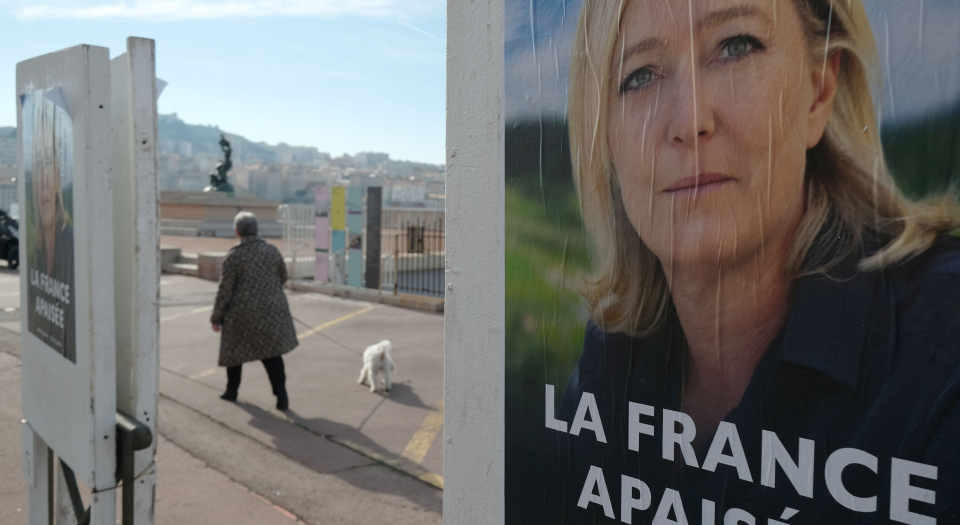
Long-read
Understanding the Front National
Why Marine Le Pen’s Front National is now the largest single party in France.
The two things I often hear from supporters of the Front National are ‘something has to change’ and ‘France was better in the past’. They have a desire for change that is largely driven by a sense of loss, a negative reaction to the state of France today. Shopkeepers list the prices of common items – eggs, milk – observing how much more expensive they are now. Everything, even inflation, is seen as evidence of French decline.
Front National supporters’ concern with immigrants (particularly Muslim immigrants) is best understood through the prism of this sense of loss. It’s not primarily about racism. Rather, it is born of the sense that ordinary French people are not being recognised or prioritised by the political class. The immigrant functions as a figure of those who are being prioritised in their place. Working French aren’t being put first, so someone else must be. Les Français d’abord! – French people first – is an FN slogan, and the party has policies for prioritising native French. ‘There are homeless people in France too’, people say, ‘why not help them before helping Syrians?’.
For FN supporters, the immigrant is also the figure that is undermining French culture, through his unwillingness to respect the ways things are done. Immigrants don’t want to integrate; they don’t respect France. They are apparently the reason that the French no longer feel at home in France. Nous sommes chez nous (We are at home) is another Frontiste slogan, often directed against the immigrant blamed for their own sense of unease.
The roots of the Front National lie in the 1950s Poujadist protest movement against government bureaucracy and big business. Poujadism, named after its driving force Pierre Poujade, was grounded in the worldview and interests of the small business owner and shopkeeper, who was being squeezed by taxes, Parisian bureaucrats and large business interests. The small business owner was a prime constituency of Jean-Marie Le Pen (a former Poujadiste) when he launched the Front National in the 1970s. The party was for independence and hard work, traditional morality and family values. It was against state bureaucracy, welfare, Europe and big business, intellectuals, immigrants and homosexuals.
The Front National still has a certain grounding in the values and perspective of the small business owner, particularly in the southern and south-west regions. These are regions where, to a degree, old-style French community and ways of life persist. Front National voters here are not talking about some fantasy of being French: it is the way they are actually living. They are calling for the way they are actually living to be recognised and protected. It is this that gives the party a social base, and means that it is more grounded than other populist parties, such as UKIP in Britain.
From the beginning, however, the Front National was something of a catch-all for various left-behind elements in French society. In the 1970s this included monarchists who regretted the French Revolution and the founding of the Republic, anti-Semites and wartime collaborators yearning for the Vichy, and pro-colonialists who regretted the loss of French Algeria in the early 1960s. This basket-case element has grown over time, as the Front National has mopped up voters released by the crisis of mainstream institutions. It has taken former Communists, former Socialists, former Gaullists, the young unemployed and now even parts of the business class. Every institutional disintegration has meant more Frontistes.
Marine Le Pen, the Front National’s leader since 2011, has sought to distance the party from its past, acrimoniously jettisoning her father and embarking on a policy of dédiabolisation (de-demonisation). There is an attempt to broaden the appeal, to absorb the discontented of the nation. Front National is making rapprochements with the Jewish community and setting up groups in elite colleges such as Sciences Po. The Front National says that it is neither left nor right, and its policies include disparate elements from various absorbed constituencies: tax-cutting measures on the one hand, and social-state measures such as the 35-hour week on the other.
Its supporters seem to have an energy and conviction that outstrips those of other parties. You always see Front National posters in the most out of the way places: on bridges, ring roads, in mountain villages. The posters may be vandalised (Marine Le Pen often sports a moustache) but they are the only posters there. The vandals didn’t bother to put up rival posters of their own.
The question of being for or against the Front National has become the primary schism in French political life. People vote for it, or they vote against it: the other schisms have become less important. Marine Le Pen derisively amalgamates the names of the Gaullist and Socialist parties to ‘UMPS’. Indeed, in the 2015 local elections, the Socialist Party withdrew some of its candidates from the second round, in order to send its supporters to the Gaullists and prevent a Front National victory. This was an unprecedented act. The governing party showed that it was prepared to sacrifice its own candidates, sell over its supporters. What really mattered was the defeat of the Front National.
This schism of pro- and anti-Front National is grounded less and less in political differences. While Gaullists have taken on Frontiste policies and language, the Front National has taken on Socialist policies. Instead, the conflict increasingly takes the form of a sheer political polarity, a sheer mutual opposition. The Front National is defined by being anti-mainstream, anti-establishment; the mainstream is defined as being anti-Front National. It is the mutual opposition that defines the integrity of both parties.
Currently, the Front National is the largest single party, but the combined anti-Front National vote is larger. This suggests that Le Pen will win the first round of the presidential election but lose the second. But who knows? Maybe Le Pen will succeed in uniting a greater proportion of the disaffected underneath her tricolore. Were this to happen, the contradictions within the party would come more clearly into view.
Josie Appleton is author of Officious – Rise of the Busybody State and writes at Notes on Freedom.
No paywall. No subscriptions.
spiked is free for all.
Donate today to keep us fighting.
Donate onlineTo enquire about republishing spiked’s content, a right to reply or to request a correction, please contact the managing editor, Viv Regan.







Comments
Want to join the conversation?
Only spiked supporters and patrons, who donate regularly to us, can comment on our articles.